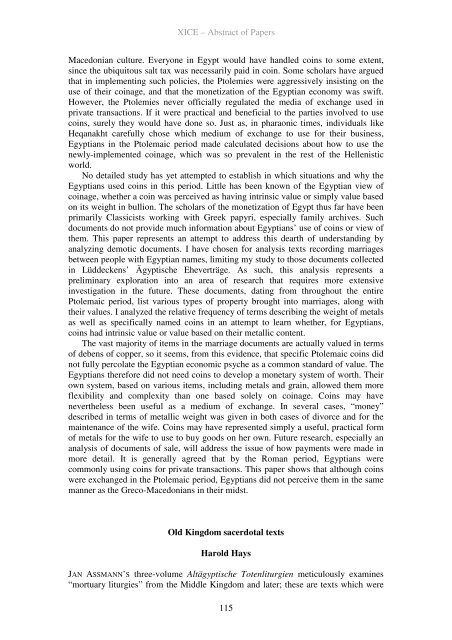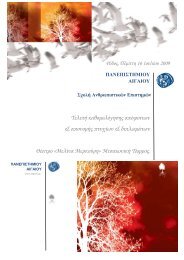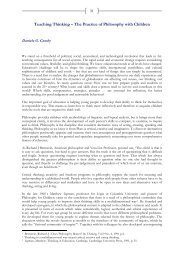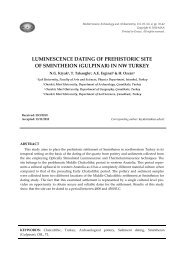Tenth International Congress of Egyptologists Abstracts of Papers
Tenth International Congress of Egyptologists Abstracts of Papers
Tenth International Congress of Egyptologists Abstracts of Papers
You also want an ePaper? Increase the reach of your titles
YUMPU automatically turns print PDFs into web optimized ePapers that Google loves.
XICE – Abstract <strong>of</strong> <strong>Papers</strong><br />
Macedonian culture. Everyone in Egypt would have handled coins to some extent,<br />
since the ubiquitous salt tax was necessarily paid in coin. Some scholars have argued<br />
that in implementing such policies, the Ptolemies were aggressively insisting on the<br />
use <strong>of</strong> their coinage, and that the monetization <strong>of</strong> the Egyptian economy was swift.<br />
However, the Ptolemies never <strong>of</strong>ficially regulated the media <strong>of</strong> exchange used in<br />
private transactions. If it were practical and beneficial to the parties involved to use<br />
coins, surely they would have done so. Just as, in pharaonic times, individuals like<br />
Heqanakht carefully chose which medium <strong>of</strong> exchange to use for their business,<br />
Egyptians in the Ptolemaic period made calculated decisions about how to use the<br />
newly-implemented coinage, which was so prevalent in the rest <strong>of</strong> the Hellenistic<br />
world.<br />
No detailed study has yet attempted to establish in which situations and why the<br />
Egyptians used coins in this period. Little has been known <strong>of</strong> the Egyptian view <strong>of</strong><br />
coinage, whether a coin was perceived as having intrinsic value or simply value based<br />
on its weight in bullion. The scholars <strong>of</strong> the monetization <strong>of</strong> Egypt thus far have been<br />
primarily Classicists working with Greek papyri, especially family archives. Such<br />
documents do not provide much information about Egyptians’ use <strong>of</strong> coins or view <strong>of</strong><br />
them. This paper represents an attempt to address this dearth <strong>of</strong> understanding by<br />
analyzing demotic documents. I have chosen for analysis texts recording marriages<br />
between people with Egyptian names, limiting my study to those documents collected<br />
in Lüddeckens’ Ägyptische Eheverträge. As such, this analysis represents a<br />
preliminary exploration into an area <strong>of</strong> research that requires more extensive<br />
investigation in the future. These documents, dating from throughout the entire<br />
Ptolemaic period, list various types <strong>of</strong> property brought into marriages, along with<br />
their values. I analyzed the relative frequency <strong>of</strong> terms describing the weight <strong>of</strong> metals<br />
as well as specifically named coins in an attempt to learn whether, for Egyptians,<br />
coins had intrinsic value or value based on their metallic content.<br />
The vast majority <strong>of</strong> items in the marriage documents are actually valued in terms<br />
<strong>of</strong> debens <strong>of</strong> copper, so it seems, from this evidence, that specific Ptolemaic coins did<br />
not fully percolate the Egyptian economic psyche as a common standard <strong>of</strong> value. The<br />
Egyptians therefore did not need coins to develop a monetary system <strong>of</strong> worth. Their<br />
own system, based on various items, including metals and grain, allowed them more<br />
flexibility and complexity than one based solely on coinage. Coins may have<br />
nevertheless been useful as a medium <strong>of</strong> exchange. In several cases, “money”<br />
described in terms <strong>of</strong> metallic weight was given in both cases <strong>of</strong> divorce and for the<br />
maintenance <strong>of</strong> the wife. Coins may have represented simply a useful, practical form<br />
<strong>of</strong> metals for the wife to use to buy goods on her own. Future research, especially an<br />
analysis <strong>of</strong> documents <strong>of</strong> sale, will address the issue <strong>of</strong> how payments were made in<br />
more detail. It is generally agreed that by the Roman period, Egyptians were<br />
commonly using coins for private transactions. This paper shows that although coins<br />
were exchanged in the Ptolemaic period, Egyptians did not perceive them in the same<br />
manner as the Greco-Macedonians in their midst.<br />
Old Kingdom sacerdotal texts<br />
Harold Hays<br />
JAN ASSMANN’S three-volume Altägyptische Totenliturgien meticulously examines<br />
“mortuary liturgies” from the Middle Kingdom and later; these are texts which were<br />
115






